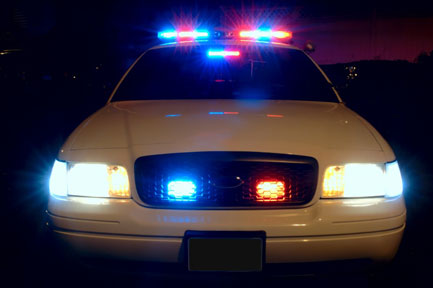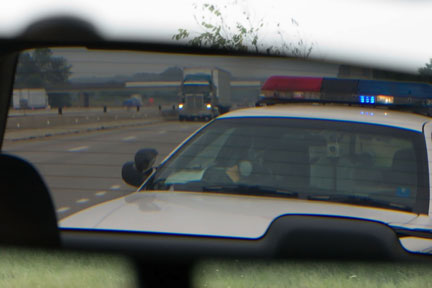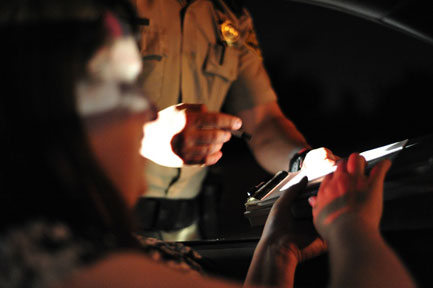Understanding the Other Side: An Officer's Roadside Confessions
Warren Williams
Most of us have been on the receiving end of a traffic citation or seven, but what's it like to issue a ticket? What goes on in the mind of an officer as he's handing out that dreaded piece of paper? In this piece one officer attempts to answer some of the more frequently asked questions and speaks to the reasoning behind a ticket.
I’ve pulled a broken, bleeding toddler from a half-submerged van, I’ve seen pieces of brain spread down a ditch, and I’ve stood in a living room while a mother sobbed on my shoulder because her child is never coming home. These experiences don’t make me special, but they do qualify me to explain the reason police officers give traffic tickets. If one of my tickets helps to save a life, I’ve done my job.
There are a fortunate few who will never be asked for their license and registration, but getting a ticket may have happened to you once or twice. For whatever reason you’ve found yourself running behind and you’re scurrying to get your day back on track by way of a rolling stop or speeding, when you see the blue lights in the rearview mirror most everyone thinks the same thing:
“Ooooohh ____.” (Everyone has a favorite expletive.)
At that moment you’re probably not thinking that there are two people involved in the conversation about to ensue—and it’s not going to be enjoyable for either party:
“Do you know why I stopped you?
“No, sir, I don’t.”
Shouldn’t you know that?
“Well, I stopped you for your speed. Was there a reason for speeding today?”
Here comes the routine.
Don’t get me wrong; I’ve been on the “yes sir/no sir” side too. I know what it’s like to think that boy in blue is the dumbest rock on the roadway. But alas, dear reader, I can’t always be on your side.
From my side, it can actually be pretty entertaining to watch people throw out excuses in desperation, with each person thinking they have the most original, effective excuse out there. It usually begins with, “You see what happened was…”
I really have to go to the bathroom. I’m late for church/school/work/therapy. This is an emergency. I thought if I drove the speed limit I would look suspicious and you would think I was a criminal.
Because the two parties are coming at the same situation from different angles, misunderstanding easily occurs. As a police officer, I’m trained to view each encounter as one where I literally must fight for my life. Police instructors across the country say, “There’s no such thing as a routine traffic stop.” Melodramatic? Maybe in the civilian world, but as an officer it rings true.
For the driver a stop is often an awful way to end an already horrible day, and an eruption of emotion is not far behind.
On the first day in the academy, instructors show countless videos of officers being beaten, shot, overpowered and killed. To them, this is the first step of eliminating the weak. Training is a process to find out who has what it takes to do the job and, just as importantly, who doesn’t. It is with that history that any officer approaches your window.
An officer at a traffic stop is a cross between a principal and the kindergartener he or she is lecturing. Principals don’t like to be talked back to and kindergartners hate being told they’re wrong. The funny thing is that the officer and violator each experience both roles, often toggling back and forth. Both individuals feel like they are justified in their actions and both want to be fully heard and understood. Ironically, the harder each tries to be heard, the less likely it is that either will be.
The catalyst to this process often starts as a side remark or maybe a direct insult; whether the remark was purposeful or indirect, the result is the same. Volumes rise. I know that some officers can be a bit abrasive and direct in their presentation. A result of that is an uncooperative, disrespectful driver. It can also start on the other side. The key for both sides is to realize that there is a human being on the other side of the conversation and to respond accordingly.
Please understand: as an officer it is my job to change a dangerous behavior. If I make a stop and don’t do that (with or without a ticket), I haven’t done my job. A personal goal is to have a positive interaction on every stop. That doesn’t mean that I’ll be having a beer with the driver later. What it does mean is that I’m going to do my best to help that particular person understand why he or she is being stopped and ticketed. No one is ever happy about a ticket, but if they feel like they’ve been heard and respected, that’s a “positive” in my world.
I ticket the violation, not the person. This isn’t a catch phrase; it is a way that I’ve found to explain my philosophy on enforcement. It is a balance in my mind about why I’m taking an enforcement action. Drivers shouldn’t be able to talk themselves into a ticket anymore than they should be able to talk themselves out of one. One of the hardest parts of my job is swallowing my pride and not allowing a bad attitude to compromise a decision.
When I stop a vehicle, I’ve already decided if the driver will or will not receive a citation. Unfeeling nazi of the road? You can believe that if you want, but I believe it’s fairness. In my mind, if I know I’m giving a warning it helps to keep me focused on an informative interaction with the driver. That said, once I’ve decided to write a citation there is not much that can be done to talk me out of it. Again, the action that the driver chose is what’s being ticketed. Is there a fairer way to enforce the laws that I’ve sworn to uphold?
In my experience the best interactions have been when the driver starts by being honest. A simple, “yeah I know, sorry about that,” goes far in making your experience more tolerable. This approach is refreshing because most drivers choose instead to try lying their way out of trouble.
So I know what you’re thinking: “That’s all well and good, but get to the stuff that will help me.” The question I get most often is, “Exactly how fast can I go without getting a ticket?” There’s no good answer for that. Every officer is different. Most officers have a set of standards they use to focus their enforcement contacts. Be aware that even one mile per hour over the speed limit can be ticketed. Go the speed limit and there won’t be a problem.
Here are a few pointers to make your traffic stop more bearable:
- Be honest. We both know why we’re on the side of the road. Just ‘fess up and we’ll get out of there faster. My ultimate goal is to change a driving behavior. If I can do that without writing a ticket I will, but if you can’t even admit your mistake I don’t really think you’re going to take the warning into account the next time you get behind the wheel.
- Don’t make any sudden moves to unseen areas of the vehicle. If your wallet or driver license falls, let the officer know what you’re doing. A little extra time is better than looking down the barrel of a gun.
- Have your correct information ready at hand. Being unprepared can be frustrating for you and the officer.
- Keep your temper at a minimum. It may feel good, but it doesn’t do any good to yell. You aren’t going to get out of the ticket; you’re just going to lose your voice.
This is one officer’s attempt to help you understand the interaction that takes place on the roadside. There is no guarantee every cop thinks like me. Law enforcement is the same as any other work place; there are those who are trusted, those who are disliked, and those who really don’t deserve to be there. Regardless, some courtesy and logic will improve the encounter for everyone. So if you do get pulled over in the future, think back to this article and try to understand the situation from the officer’s point of view—it will improve your rhetorical approach, for sure, but it just might change your driving behavior for the better, too, which is what we’re really after.
Warren Williams has been serving as a police officer for 5 years. He graduated with a Bachelor of Arts in Communication from a small college in Ohio. He lives with his wife and dog.


